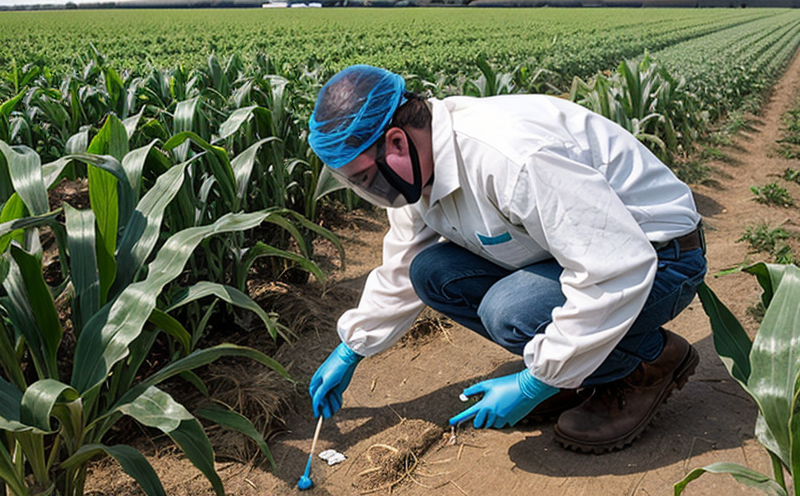Acetamiprid Residue Testing in Crops
Agriculture and Forestry Testing is a critical component of ensuring food safety, environmental protection, and compliance with international standards. Pesticide residue testing plays a pivotal role in this domain by helping to determine the presence and levels of pesticides, such as acetamiprid, in crops. Acetamiprid is an insecticide belonging to the pyrethroid class, widely used for controlling pests like aphids and thrips.
The demand for high-quality produce has led to a growing need for accurate pesticide residue testing. Compliance with international standards such as ISO 3666:2018 (Methods of determination of organophosphorus insecticides in foodstuffs) is essential for ensuring the safety and quality of crops. In this context, Acetamiprid Residue Testing not only helps in maintaining product quality but also ensures that the crop meets regulatory requirements.
The testing process involves several critical steps including sample collection, preparation, extraction, and analysis using advanced instrumentation such as Liquid Chromatography-Mass Spectrometry (LC-MS/MS). This method provides high sensitivity and specificity, making it ideal for detecting acetamiprid residues at trace levels. The following section will delve into the industry applications of this testing service.
Industry Applications
Agricultural producers, food manufacturers, and regulatory bodies rely on accurate pesticide residue testing to ensure compliance with international standards and maintain product quality. Below is a detailed look at how acetamiprid residue testing can be applied across various sectors.
- Food Manufacturing: Ensuring that crops used in the production of food products do not exceed acceptable levels of acetamiprid residues, thereby protecting consumer health and maintaining brand reputation.
- Regulatory Compliance: Meeting regulatory requirements such as those set by the World Health Organization (WHO) and Food and Agriculture Organization (FAO) to ensure that crops are safe for consumption.
- R&D in Agriculture: Identifying optimal pesticide application rates and timing, which can enhance crop yield while minimizing environmental impact.
| Sample Type | Acceptance Criteria |
|---|---|
| Corn | Residue levels must not exceed 0.1 ppm as per the WHO guidelines. |
| Soybeans | Residue levels should be below 0.2 ppm to comply with FAO standards. |
| Rice | Pesticide residues must not exceed 0.3 ppm as per the European Union regulations. |
Eurolab Advantages
Eurolab, with its state-of-the-art laboratories and experienced scientists, offers unparalleled expertise in Acetamiprid Residue Testing. Our team of professionals ensures that the testing process is both efficient and accurate. Here are some key advantages:
- Accurate Results: Utilizing cutting-edge LC-MS/MS technology, our laboratory provides precise results for acetamiprid residue levels in crops.
- Compliance with Standards: Our testing aligns with international standards such as ISO 3666:2018 and ensures that your products meet the required specifications.
- Rapid Turnaround Time: We offer quick turnaround times for our clients, allowing them to make informed decisions promptly.
- Expertise in Agriculture: Our team has extensive experience in agricultural testing, providing tailored solutions based on specific crop needs and regulatory requirements.
We are committed to delivering reliable and accurate results that meet the highest industry standards. Contact us today for more information about our services.
Environmental and Sustainability Contributions
The testing of acetamiprid residues in crops is not only crucial for food safety but also plays a vital role in environmental sustainability. By ensuring that pesticide levels are within acceptable limits, we help protect the environment from potential harm caused by overuse or misuse of pesticides.
Reduced Environmental Impact: Accurate testing ensures that farmers can apply acetamiprid only when necessary, reducing unnecessary exposure to the environment and minimizing the risk of contamination. This aligns with broader sustainability goals aimed at preserving ecosystems and biodiversity.
Enhanced Crop Quality: By identifying and managing acetamiprid residues, we contribute to producing high-quality crops that meet both consumer demand and regulatory requirements. This helps in maintaining brand reputation and fostering trust among consumers.
In conclusion, Acetamiprid Residue Testing is a critical service that supports the agricultural sector's efforts towards sustainability and compliance with international standards. Eurolab's expertise ensures that this testing process is both efficient and accurate, contributing positively to environmental and social well-being.





